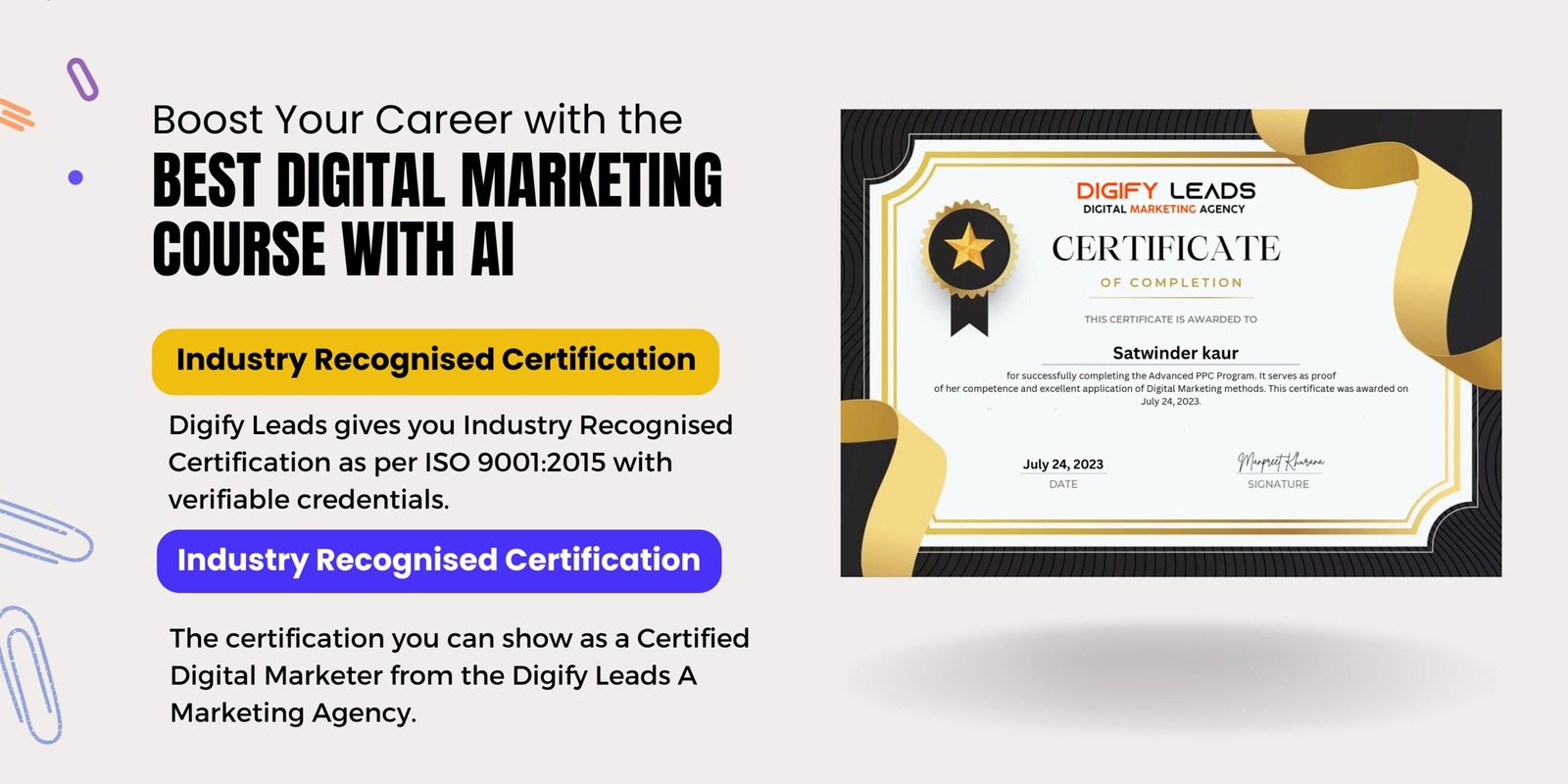Advanced AI-Powered Digital Marketing Course with Certification and 100% Job Placement
- ✅ Unlock SEO, Social Media, Google Ads & AI Skills in one powerful course!
- ✅ Supercharge your career with AI-driven marketing strategies
- ✅ Hands-on training with real-world projects led by industry experts
- ✅ 60+ high-impact modules designed for success
- ✅ Fast-track your future in just 3 months!
- ✅ Flexible EMI options – Invest in your career today!
What is a digital marketing course, and what are the career options and salary potential?
Who Can Join Our Digital Marketing Course In Mohali ?
- Freshers and Job Seekers
- Business Owners
- Working Professionals
- Housewives
Student Placement Reviews

AI powered - Digital Marketing Course MOdules
Newly Launched Best AI Digital Marketing Course in Mohali
- Search Engine Optimization (SEO)
- Social Media Optimization (SMO)
- Google Ads
- Social Media Marketing (SMM)
- Inbound Marketing
- Leads & Traffic Generation
- E-mail Marketing
- Blogging
- Content Marketing
- Google Search Console
- Google Analytics 4
- Basic Description of SEO
- Crawlers & Google Algorithms, Major Search Engines
- Domain Name, Hosting and Important SEO Tool
- Keyword Research, LSI, Density & Stuffing
- Initial Site & Competitor Analysis
- Title & Meta Tag, Alt Optimization, Content Optimization
- Site Structure, URL renaming
- Creation of Favicon, H1, H2, H3 Tags Anchor Text
- Google Analytics, Search Console, Schema Markup
- Robots .txt file, .htaccess file
- Canonical Tag Optimization, 404 error (removal & redirects)
- XML & HTML Site-map, Open Graph Technique
- What Is Backlinks
- Search Engine, Social Bookmarking
- Blog Commenting , Blog Posting, Forum Posting
- Article Submission, Doc, Text to Voice Submission
- Image, PDF, PPT, Info-graphic Submission Video Submission
- Classified Ads, Social Bookmarking Creation
- Local Google Map Creation, Citation Building
- Quora Question & Answering
- Guest Posting & Paid Backlinks
- Local Business Reviews
Social Media Optimization (SMO)
- Introduction to Social Media
- Social Media & Brand Management Strategy
- How Social Media is affecting Google Search
- Profile Creations – Instagram, Facebook, Linkedin, Twitter, Quora, Reddit, Quora, Pinterest, Flickr, Tumblr
- Using # & @ tags
- Building Relationship
- Finding People & Companies on Twitter (specific location)
- Uploading video & Increase video Views, subscribers,
- Social sharing, commenting & reviews
- Monetization of video
- Advanced Reporting
Topics
- What are Google Ads
- Types of Google Ad Formats
- Difference between Search and Display Campaigns
- What is CTR, Impressions and CPC
- Keyword Research Planner
- Keyword Match Types – Broad, Phrase and Exact.
- Ad Group Structure
- Ad Scheduling
- Budget and Billing
- Ad Assets and Extensions
- Ad Preview and Diagnosis
- Campaign Structure
- Types Of Bidding
Topics
- Introduction to Social Media
- Advantages & Social Media Strategy
- SMM – Facebook, Instagram, LinkedIn, Twitter, YouTube (Profiles, Reals , Pages, Apps & Groups)
- Setting Campaign, Creating Different Types of Ads
- Target Location, Audience, Budget
- Create Pixel Code for Conversion, Performance Report
- Ad Campaign Optimization, Leads Generation
- Introduction to LinkedIn, Managing Connections
- LinkedIn Adverting, Increasing ROI, Leads in LinkedIn
- Introduction of Twitter, Create Company & Individual Profiles
- How to Tweet with Hash-Tags
- Twitter Advertising, Twitter Billing & Analytics
- How to get Leads & Traffic
- Tips for increase Followers
- Make a Campaign report
Topics
- Overview of Inbound Marketing
- Essentials of an Effective Inbound Strategy
- Optimizing your website for Search Engines
- Creating Content with a Purpose
- The Fundamentals of Blogging
- Amplifying Your Content with Social Media
- Enticing Clicks with Call-to-Action
- The Anatomy of a Landing Page
- Optimization of Thank you Page
Topics
- What is Lead
- How to Get Relevant Leads
- Importance of Lead Generation
- How to increase Leads Online
- Role of Landing Page
- Role of Thank you Page
- Converting Visitors into Leads
- Converting Leads into Sales
- What is Traffic
- Type of Traffic
- How to Analyse & Track Traffic
- Ways to Increase Traffic
Topics
- Introduction to E-mail Marketing
- Email as Conversation
- Creating the HTML Email
- Type of Email Marketing
- Landing Pages Optimization
- How to Create Mailing List
- How to Observe Spam words
- Top Email Marketing Software & Online Tools
- What is Auto Responds
- How to set up Auto Responds
- How to Land in the inbox instead of Spam Folder
- Improve ROI via A/B Testing
- Metrics & Measurements
Topics
- What is Blogging
- Benefits of Blogging
- How to Create First Blog
- How to create New Post
- How to Create New Pages
- Earn Money From Blogging
- How to Customize & manage settings
- How to Promote Blog Website
Topics
- What is Content Marketing
- Benefits of Content Marketing
- Content Marketing Strategy
- Why Business Need a Content Marketing Strategy
- Content Marketing Responsibilities
- Creation of Content
- Optimize that content for SEO
- Manage Social Media
- Create Unique & Share-able Content
- Tutorial & Events Based Content
- Content Spinning
- Grammar Checker Tool
- Duplicate Content Checker Tools
- Blog, Article & Content in Image Submission
- Keywords Based Content
Topics
- Introduction to Google Search Console
- Importance of Google Search Console
- Account Setup
- Adding Websites to Google Search Console
- Tracking the performance of the website in Google Search Console
- Checking Crawling Status, Crawling Errors, & Indexing Status
- How to add Sitemap in Google Search Console
- How to check and add robots
- What is Google Automatic Penalties
- Using Google Link Disavow Tool
- WWW & Non-WWW Website Versions
- Language & Country Targeting through Google Search Console
- New Advance Activities in Google Search Console
- Internal Link & Back Links Analysis through Google Search Console
Topics
- Understanding Google Analytics
- How Google Analytics Works
- Google Analytics Account Structure
- Google Analytics Insights
- Setup a Google Analytics account for Website or Apps
- Guideline of Google Analytics Account
- How to add Analytic code in Website
- What is Cookie Tracking
- Types of Cookie Tracking used by Google Analytics
- Tracking of Visitors in Google Analytics
- Tracking Traffic
- Understanding Goals & Conversions
- Types of Goals
- Difference Between Bounce Rate & Exit Rate
- Technique Reduce Bounce Rate
- Understanding Real-Time Visitors
- Setup of Funnels in Google Analytics
- Importance of Funnels
- How to integrate Ads & Analytics Account
- Benefits of Integrating Ads & Analytics Account
- Observing Paid Marketing Campaign in Google Analytics
- What is Ling Tagging, Filters & Segments
- Creating A Customize Reports
AI powered - Digital Marketing Course Modules
Newly Launched Best AI Digital Marketing Course in Mohali
- Search Engine Optimization (SEO)
- Social Media Optimization (SMO)
- Google Ads
- Social Media Marketing (SMM)
- Email Marketing
- WordPress Website
- Photo & Video Editing
- SEO Basics & Algorithms: Understand SEO fundamentals, including crawlers, Google algorithms, and major search engines.
- Domain, Hosting & Tools: Learn the importance of domain names, hosting, and essential SEO tools for optimization.
- Keyword Research & Optimization: Conduct keyword research, manage LSI, density, and avoid stuffing for better ranking.
- Site & Competitor Analysis: Analyze your website and competitors to enhance SEO strategy.
- On-Page Optimization: Optimize title tags, meta tags, alt tags, and content for SEO.
- Site Structure & Tags: Improve site structure, URL naming, and use H1, H2, H3 tags effectively.
- Technical SEO: Set up Google Analytics, Search Console, and manage robots.txt, .htaccess, and schema markup.
- Off-Page SEO & Backlinks: Focus on building high-quality backlinks through blog commenting, social bookmarking, and guest posting.
- Content & Media Submissions: Submit articles, PDFs, images, videos, and infographics for broader reach.
- AI in SEO: Leverage AI for keyword research, content optimization, and link-building strategies for enhanced performance.
- Social Media & Brand Strategy: Build brand awareness through social platforms; AI automates content distribution and brand insights.
- Impact on Google Search: Social activity affects SEO rankings; AI tracks its influence on visibility.
- Profile Creation: Optimize profiles on major platforms; AI enhances bios, keywords, and discoverability.
- Hashtags & Mentions: Use AI to find trending hashtags and optimal posting times for wider reach.
- Building Relationships: AI helps engage followers, influencers, and companies.
- Finding People on Twitter: AI assists in locating relevant users by location.
- Video Upload & Growth: AI optimizes video SEO, increasing views and subscribers.
- Social Sharing & Reviews: AI automates tracking shares, comments, and reviews for engagement.
- Video Monetization: AI analyzes video performance to maximize monetization.
- Advanced Reporting: AI offers detailed social media performance insights.
- Google Ads: A platform for businesses to display ads across Google search results, YouTube, and websites.
- Ad Formats: Text, image, video, and shopping ads, each designed to reach different audiences effectively.
- Search vs Display Campaigns: Search ads appear on Google results, while display ads are shown across Google’s partner sites.
- CTR, Impressions & CPC: Key metrics like Click-through rate (CTR), impressions, and Cost-per-click (CPC) help measure ad performance.
- Keyword Research: Google’s Keyword Planner helps discover relevant keywords for targeting.
- Keyword Match Types: Choose from broad, phrase, or exact match types to optimize keyword targeting.
- Ad Group Structure: Organizing ads into ad groups allows better control and relevance around specific keywords.
- Ad Scheduling: Set ads to run at specific times for optimal visibility and engagement.
- Budget & Billing: Manage your ad spend by setting a budget to control costs and maximize ROI.
- Ad Assets & Extensions: Use sitelinks, callouts, and other ad extensions to increase engagement and provide more information
- Introduction to Social Media Marketing: Leveraging platforms like Facebook, Instagram, and Twitter to promote your brand, products, or services.
- Profile Creation: Set up and optimize business profiles on key social media platforms for better visibility.
- Content Strategy: Develop engaging and relevant content to connect with your target audience.
- Hashtags & Mentions: Use hashtags (#) and mentions (@) to increase reach and connect with relevant users.
- Building Relationships: Engage with followers, influencers, and potential customers to build a loyal community.
- Paid Ads: Utilize targeted social media ads to reach specific audiences and achieve business goals.
- Video Marketing: Share videos to increase engagement and drive traffic, focusing on storytelling and user interaction.
- Social Media Analytics: Track performance metrics like likes, shares, comments, and reach to optimize future campaigns.
- Social Sharing & Engagement: Encourage sharing and interaction to boost visibility and strengthen brand presence.
- Influencer Marketing: Partner with influencers to tap into their audience and grow your brand’s reach.
- Introduction to Email Marketing: A direct channel to communicate with your audience through personalized, targeted emails.
- Building an Email List: Collect email addresses using sign-up forms, opt-ins, and lead magnets to grow your audience.
- Segmentation: Divide your email list based on user behavior, demographics, or interests for personalized messaging.
- Email Content Creation: Craft engaging and valuable content that resonates with your audience, including newsletters, promotions, or updates.
- Personalization: Use recipients’ names and tailor email content to their preferences for better engagement.
- Email Automation: Set up automated workflows like welcome sequences, abandoned cart emails, and follow-ups to streamline communication.
- A/B Testing: Test different subject lines, content, and call-to-actions to optimize open rates and click-through rates.
- Call-to-Action (CTA): Include clear and compelling CTAs to guide recipients toward a desired action, such as purchasing or signing up.
- Email Deliverability: Ensure your emails reach inboxes by maintaining a clean list, avoiding spammy content, and using a reputable email service provider.
- Tracking & Analytics: Monitor metrics like open rates, click-through rates, and conversions to evaluate email performance and adjust strategies.
- Introduction to WordPress Development: Utilizing WordPress as a powerful content management system (CMS) for creating dynamic websites tailored to various needs.
- Choosing a Domain and Hosting: Selecting a suitable domain name and reliable hosting provider to ensure your WordPress site is accessible and performs well.
- Installing WordPress: Setting up WordPress through hosting providers or manually installing it to begin building your site.
- Selecting a Theme: Choosing a responsive and customizable theme that aligns with your brand’s aesthetics and functionality requirements.
- Plugins and Functionality: Enhancing your website’s capabilities with essential plugins for SEO, security, performance, and contact forms.
- Creating Content: Developing high-quality, engaging content including posts, pages, and multimedia to attract and retain visitors.
- Customization: Using the WordPress Customizer and page builders to tailor your site’s layout, design, and user experience.
- SEO Optimization: Implementing SEO best practices, including keyword optimization, meta tags, and site structure, to improve search engine visibility.
- Testing and Launching: Conducting thorough testing across devices and browsers to ensure functionality, speed, and responsiveness before launching the site.
- Ongoing Maintenance and Support: Regularly updating WordPress, themes, and plugins, along with monitoring site performance, to keep your website secure and running smoothly
Introduction to Video & Photo Editing: Utilizing software tools to enhance and manipulate videos and images for professional and personal projects.
Choosing the Right Software: Selecting appropriate editing tools like Photopea, Canva, Clipchamp based on project requirements.
Importing Media: Importing photos and videos into the editing software, organizing files, and preparing them for editing.
Basic Editing Techniques: Learning fundamental editing skills, such as trimming clips, adjusting brightness and contrast, cropping images, and stabilizing footage.
Adding Effects and Filters: Applying visual effects, transitions, and filters to enhance the overall aesthetic and mood of the content.
Sound Editing: Incorporating background music, voiceovers, and sound effects, and adjusting audio levels for a balanced sound experience.
Color Correction and Grading: Adjusting colors and tones in photos and videos to achieve a specific look or feel, enhancing storytelling through visual consistency.
Text and Graphics: Adding titles, captions, and graphics to provide context, highlight important information, and engage viewers.
Exporting and Sharing: Choosing the right export settings based on the intended platform (e.g., social media, websites, or presentations) to ensure optimal quality.
Continuous Learning and Experimentation: Staying updated with the latest editing techniques, trends, and software features to continuously improve skills and creativity.
Let's get in touch!
Testimonials
What Clients say about us
With the best Google Ads agency in Delhi our mission is to partner with customers for their success as we create a diverse client base including companies and individuals functioning in many different fields and economies.





Frequently Asked Questions about our Google Ads Agency in Delhi
The duration of the Digify Leads' Digital Marketing course is 3 months, this is enough timeframe for comprehensive learning and skill development in the field of digital marketing.
To Enroll in a digital marketing course in Mohali, Chandigarh, you need to follow these steps:-
- Visit the institute
- Fill out the admission form
- Deposit the fees
Class size of 8-10 students in a digital marketing course offers several advantages, particularly in terms of individualized attention and interactive learning.
- After 12th Grade or During Graduation: Joining a digital marketing course after completing high school or while pursuing your graduation can be a strategic move.
- No Age or Educational Barrier: Digital marketing doesn't have age or educational restrictions.
- Skill-Based Course: Digital marketing is centered around skills that are highly relevant in today's digital world.
- Fast Career Growth: Pursuing a Digital Marketing Mastery Course can be particularly valuable when you're looking to expedite your career growth.
- Basic Reading and Writing Skills: While you don't need to be an English language expert, having basic reading and writing capabilities in English is important.
- Job Purpose: If your intention in taking the course is to secure a job in the digital marketing field, English proficiency becomes more crucial.
- Business Growth: If you're taking the course to enhance your current business's growth through digital marketing strategies, you may not need to be highly proficient in English.
Yes, we do provide 100% placement assistance to the deserving candidates.
If you complete the course as per instructions & clear exams, getting a job is guaranteed.
Job Placement means that we recommend students to companies hiring digital marketers on different profiles. Therefore, we help the students hunt the right opportunity and assist them via scheduling interviews if they have completed the course as per our defined parameters.
Yes of course, we do provide one FREE demo class
Firstly, as a fresher in digital marketing you get to work in any one of the streams of digital marketing. You’re hired in a particular field like SEO, Social Media, Paid Ads management, content marketer, etc. And your key result areas define your initial salary.
Second, your initial salary offering also depends upon your educational background, soft skills like communication, your knowledge of digital marketing tools and channels, also the city of the company & size of the company.
In B-level cities like Chandigarh, Mohali and Panchkula average fresher salary offered is between 14k to 22k per month.
After getting an experience of 3-4 years and taking responsibilities at managerial level you can be offered between 6 to 12 lacs per annum or even more depending upon how you grew your skills.








